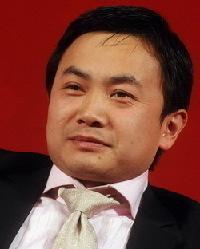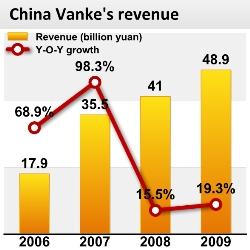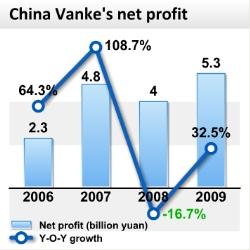
Mao Daqing, vice president of China Vanke Co Ltd.
Vanke vows to use environmentally friendly construction methodsBEIJING: China Vanke Co, the country's biggest property developer by market value, said on Monday its 2009 profit rose 32 percent to 5.33 billion yuan ($776 million), thanks to soaring real estate sales and prices last year.Due to the rebound in China's real estate sector last year, Vanke's contracted sales hit 63.4 billion yuan, the company said in a statement. And it expects sales to rise at least 20 to 30 percent in 2010.
Vanke shares, which have fallen 13 percent this year compared with a 7 percent drop in the CSI 300 Index, climbed 0.1 percent on Monday to close at 9.44 yuan in Shenzhen.
"Selling only decorated, environment-friendly homes built in a highly industrialized way is Vanke's strategic focus for 2010," Mao Daqing, vice-president of China Vanke Co Ltd, told China Daily in an exclusive interview.
All these efforts, Mao said, are aimed at reducing energy consumed in the building process and to improve operational efficiency, which are the company's competitive strengths compared to its rivals.
Industry statistics show that decorating a 90 square meter apartment will produce 2 tons of garbage, with half of them being non-biodegradable. But uniform decoration by property developers could cut this waste by more than half.
The benefits of building homes in a highly industrialized way are also similar. According to Vanke's calculation, the construction of a 19-story building needs 24 months in the traditional way, but the time limit could be shortened to 20 months through industrialized methods. And it could save 60 percent of water usage and reduce construction waste by 80 percent.
"China Vanke plans to produce 1 million sq m of residential apartments through highly industrialized methods this year, among which one fifth will be constructed in Beijing," Mao said.

The company has embarked on house industrialization since 2006 and gradually expanded this pattern to some projects in Shanghai and Beijing.
"Once reaching a certain scale, the pattern will help us largely cut costs and thus provide better products," said Mao.
When striving for building green products, Vanke has been quite active in acquiring land parcels across the country since the very beginning of 2010.
On Feb 10, Vanke bought a land parcel in Shanghai's Pudong district at the cost of 894 million yuan, 233 percent higher that the starting price. And the company also grabbed another two land parcels in Wuhan and Shenyang in the same month.
"We will actively take part in land biddings this year, but we will never struggle to be the 'land king'," said Mao. "Besides, we will explore other methods of development, such as the construction of new-rural areas and enter smaller cities that are on the fast track to economic development."
Vanke has strengthened its exploration into second- and third-tier cities in 2009. Among the 44 newly added projects last year, 37 are located in these cities.
 Robust sales and a conservative approach to land bidding also led to a healthy financial status. By the end of 2009, Vanke had 23 billion yuan cash on hand, with its debt ratio at 19.7 percent, down 13.4 percentage points from 2008, said the annual report.
Robust sales and a conservative approach to land bidding also led to a healthy financial status. By the end of 2009, Vanke had 23 billion yuan cash on hand, with its debt ratio at 19.7 percent, down 13.4 percentage points from 2008, said the annual report.
"We believe we could obtain land parcels at a more rational price in those smaller cities. But that never means we will give up opportunities in the first-tier cities," said Mao.
In Beijing, a 49,000 sq m lot of commercial land is expected to be sold for more than 10 billion yuan in early March, a record for Beijing's land market. The slot, dubbed as "Zhongfu land" by insiders, is located in the capital's Central Business District, with the new China Central Television tower and the China World Trade Center in sight."We will also take part into the bidding, but such a project is not our ideal choice, as it is a purely commercial one," said Mao.
Vanke President Yu Liang told media earlier that the company will explore the commercial property sector this year, with a target of 20 percent in the company's overall business portfolio.
"In fact, we have had commercial equipment in almost each residential building we developed. And we take the commercial sector as a supporting facility for the residential project," said Mao.





